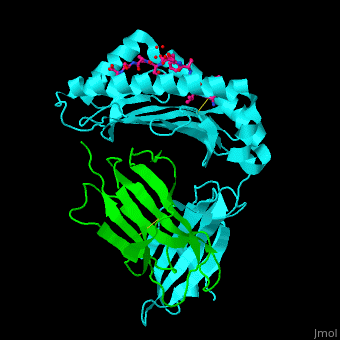We apologize for Proteopedia being slow to respond. For the past two years, a new implementation of Proteopedia has been being built. Soon, it will replace this 18-year old system. All existing content will be moved to the new system at a date that will be announced here.
Major histocompatibility complex
From Proteopedia
| |||||||||||
References
- ↑ Raghavan M, Del Cid N, Rizvi SM, Peters LR. MHC class I assembly: out and about. Trends Immunol. 2008 Sep;29(9):436-43. doi: 10.1016/j.it.2008.06.004. PMID:18675588 doi:http://dx.doi.org/10.1016/j.it.2008.06.004
- ↑ Holling TM, Schooten E, van Den Elsen PJ. Function and regulation of MHC class II molecules in T-lymphocytes: of mice and men. Hum Immunol. 2004 Apr;65(4):282-90. PMID:15120183 doi:http://dx.doi.org/10.1016/j.humimm.2004.01.005
- ↑ Liu J, Chen KY, Ren EC. Structural insights into the binding of hepatitis B virus core peptide to HLA-A2 alleles: Towards designing better vaccines. Eur J Immunol. 2011 Jul;41(7):2097-106. doi: 10.1002/eji.201041370. PMID:21538979 doi:10.1002/eji.201041370
Proteopedia Page Contributors and Editors (what is this?)
Michal Harel, Joel L. Sussman, Alexander Berchansky, Tihitina Y Aytenfisu, Eric Martz, Sandra B. Gabelli

